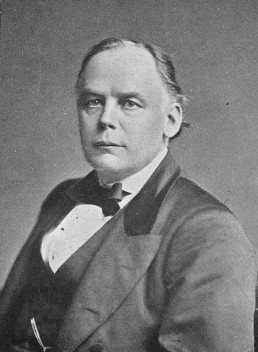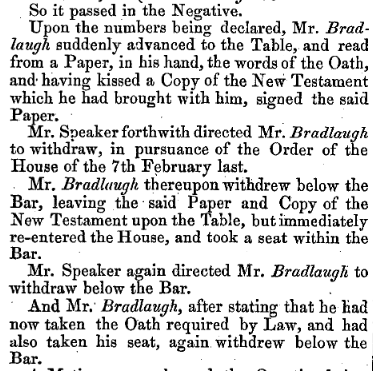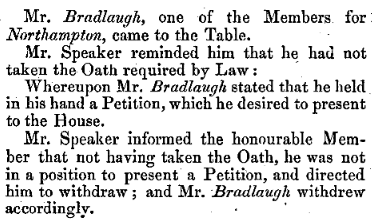Back on the MPs today, and fixing up (probably) the most confusing one-term record of all, Charles Bradlaugh. Since I have had to work out out a timeline for this, you all get a thread, for those unfamiliar...
Bradlaugh, a radical reformer who had founded the National Secular Society and recently been convicted for publishing birth-control materials, was elected for Northampton in 1880. So far, so straightforward.
But to sit as an MP, you must take the oath of allegiance. And as an oath, it is religious. A declared atheist, Bradlaugh objected, and in May 1880 asked to be considered as someone who was allowed to affirm instead. https://api.parliament.uk/historic-hansard/commons/1880/may/03/parliamentary-oath-mr-bradlaugh">https://api.parliament.uk/historic-...
Parliament went "oh, lord", debated it briefly, and inevitably formed a committee. While it sat, Bradlaugh turned up again and asked to take the oath, which was challenged on the grounds that as a declared atheist, he could not do so. Catch-22. https://api.parliament.uk/historic-hansard/commons/1880/may/21/parliamentary-oath-me-bradlaugh">https://api.parliament.uk/historic-...
At the end of June, the committee eventually agreed he could not take the oath, but was in favour of affirmation, and a motion was moved to allow it. After a very long debate, the House resolved that he could do neither. https://api.parliament.uk/historic-hansard/commons/1880/jun/22/adjourned-debate">https://api.parliament.uk/historic-...
The next day, enter Bradlaugh. He addressed the House (from the bar, as someone who was not yet a member) and asked to take the oath. Eventually, Bradlaugh was arrested and imprisoned by the sergeant-at-arms, to be released the following day.
On 2nd July, he affirmed, though with a big caveat next to it. But that was not the end of the story.
You could be an MP without ever sitting or voting, and so the oath was not strictly necessary. He was even a teller on a couple of occasions. But at some point in early 1881, he voted. And his opponents came back. It was agreed he had vacated his seat. https://api.parliament.uk/historic-hansard/commons/1881/apr/01/parliamentary-oath-mr-bradlaugh-new-writ">https://api.parliament.uk/historic-...
The good people of Northampton promptly re-elected him in April 1881 (though by quite a narrow margin - a 2% majority). And Bradlaugh came back to take the oath again. Enter our old friend the Sergeant-at-Arms (in his seventies, by the by) to haul Bradlaugh back out.
He was thrown out twice more, wrote a couple of letters to the Speaker setting out his position, and settled down for a bit. And then, Feb 1882, he tries to take the oath for, what, the fifth or sixth time? It went just as well as before. https://api.parliament.uk/historic-hansard/commons/1882/feb/07/parliamentary-oath">https://api.parliament.uk/historic-...
Now it gets a bit weird (it wasn& #39;t already?). On 21 Feb, his ally moved for a writ for a by-election, arguing that if they would not let him take his seat, they were disenfranchising his constituents. It failed. https://api.parliament.uk/historic-hansard/commons/1882/feb/21/parliament-privilege-northampton-new">https://api.parliament.uk/historic-...
At which point, as they say, scenes! Bradlaugh rushed in (I assume this was staged and he& #39;d been having a quiet chat to the doorkeeper outside), kissed a Bible, recited the oath, and sat down, announcing he had taken his seat.
His chief opponent, Randolph Churchill, pops up and announces the oath has not been taken in accordance with the law, & he has taken his seat during a debate; it has been vacated after all and they can now move a writ for a by-election. #S3V0266P0_18820221_HOC_94">https://api.parliament.uk/historic-hansard/commons/1882/feb/21/parliament-privilege-northampton-new #S3V0266P0_18820221_HOC_94">https://api.parliament.uk/historic-...
The Attorney-General, a man born to split hairs, then pointed out that there was no question before the House as of that moment, so it might not constitute a debate. 128 years later, you can still hear everyone blinking as they try to work that one out.
The house wrangled, broke overnight, resumed the next day, and eventually resolved that Bradlaugh "[having] irregularly and contumaciously pretended to take and subscribe the Oath required by Law, be expelled this House". He voted against it. #S3V0266P0_18820222_HOC_92">https://api.parliament.uk/historic-hansard/commons/1882/feb/22/parliament-privilege-northampton-new-writ #S3V0266P0_18820222_HOC_92">https://api.parliament.uk/historic-...
You can guess what happened next. By a slender majority, Northampton returned ... Charles Bradlaugh, fighting fit and ready for his third round. The Commons debates the matter, deciding that the old ban has expired, and they would need to resolve what to do again.
An amendment is put forward, suggesting that the law should be changed to allow secular affirmation. Remarkably, it almost passes - 257:242 - but ultimately they continue the ban on his taking the oath. #S3V0267P0_18820306_HOC_91">https://api.parliament.uk/historic-hansard/commons/1882/mar/06/parliamentary-oath-mr-bradlaugh #S3V0267P0_18820306_HOC_91">https://api.parliament.uk/historic-...
Bradlaugh does not try to take the oath again. He moves on to a different tack, and brings an action against the Deputy Sergeant at Arms for assault when removing him. https://api.parliament.uk/historic-hansard/commons/1882/may/05/presentation-of-papers">https://api.parliament.uk/historic-...
The Commons responds by having the Attorney-General defend him; there cannot be many times one of the Law Officers ended up defending in an assault case. https://api.parliament.uk/historic-hansard/commons/1882/may/09/consideration-of-writ-and-other-documents">https://api.parliament.uk/historic-...
To further complicate matters, Bradlaugh also brought a collusive lawsuit with the aid of one of his electors - I cannot quite figure out what the actual issue involved is, but eventually the courts threw it out. https://api.parliament.uk/historic-hansard/commons/1882/jun/13/resolution">https://api.parliament.uk/historic-...
Incidentally, remember the "same question cannot be put twice" rule that exercised us all so much a few months ago? It was used here, to stop a resolution calling for new legislation to allow affirmations. https://api.parliament.uk/historic-hansard/commons/1882/may/09/parliament-seats-of-members-in-this-house">https://api.parliament.uk/historic-...
Bradlaugh comes back to the House that June - but to present a petition, not to take the oath - and is politely sent away. I have lost count of the number of times this is by now.
He wrote to the Speaker a couple more times to ask to be allowed to take the Oath, and finally in May 1883 was allowed to come and make his case. It failed (again) though this time without the physical drama. https://api.parliament.uk/historic-hansard/commons/1883/may/04/communication-to-the-house">https://api.parliament.uk/historic-...
July 1883! Time grinds ever on, Bradlaugh writes to the PM (and the newspapers) to say he will come and take the oath regardless; the House sighs and wheels out the Sergeant at Arms, who by this point is probably wishing for a quiet retirement. https://api.parliament.uk/historic-hansard/commons/1883/jul/09/parliamentary-oath-mr-bradlaugh">https://api.parliament.uk/historic-...
We then get a (faintly hilarious) exchange of letters which amounts to:
CB: I& #39;m not allowed to disrupt the House. Would doing the exact same thing I was repeatedly thrown out for constitute disruption?
Speaker: Yes.
CB: OK. Gonna do it tho.
https://api.parliament.uk/historic-hansard/commons/1883/jul/12/parliamentary-oath-mr-bradlaugh">https://api.parliament.uk/historic-...
CB: I& #39;m not allowed to disrupt the House. Would doing the exact same thing I was repeatedly thrown out for constitute disruption?
Speaker: Yes.
CB: OK. Gonna do it tho.
https://api.parliament.uk/historic-hansard/commons/1883/jul/12/parliamentary-oath-mr-bradlaugh">https://api.parliament.uk/historic-...
Bradlaugh then writes to the Sergeant at Arms to check if he is planning to forcibly stop him, because he would like to obtain a court injunction in advance if so. All very polite, but distinctly surreal. https://api.parliament.uk/historic-hansard/commons/1883/jul/19/communication-to-the-house">https://api.parliament.uk/historic-...
The Attorney General is again sent off into court, muttering "is this what I get paid for?". Sadly, Parliament ends the session a little while later, so we do not see how this one plays out. https://api.parliament.uk/historic-hansard/commons/1883/jul/20/consideration-of-writ-and-other-documents">https://api.parliament.uk/historic-...

 Read on Twitter
Read on Twitter






